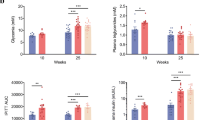Abstract
The aim of this study was to evaluate the ability of propionyl-L-carnitine to prevent cardiac damage induced by erucic acid. Rats were fed for 10 days with normal or 10% erucic acid—enriched diets with or without propionyl-L-carnitine intraperitoneally injected, (1 mM/kg daily, for 10 days). The erucic acid diet produced increases in triglycerides (from 5.6 to 12.4 mg/gww, P < 0.01), and free fatty acids (from 2.0 to 5.1 mg/gww, P < 0.01), but no changes in phospholipids. When the hearts were perfused aerobically with an isovolumic preparation there was no difference in mechanical activity. On the contrary, when pressure-volume curves were determined, the pressure developed by hearts from the erucic acid-treated rats were reduced.
Independent of diet, propionyl-L-carnitine treatment always produced positive inotropy. This was concomitant with improved mitochondrial respiration (RCI 5.1 vs 9.3, P < 0.01), higher tissue ATP content (10.3 vs 18.4 μmol/gdw P < 0.01) and reduction of triglycerides (12.4 vs 8.0 mg/gww, P < 0.01). These data suggest that propionyl-L-carnitine, when given chronically, is able to prevent erucic acid-induced cardiotoxicity, probably by reducing triglyceride accumulation and improving energy metabolism.
Similar content being viewed by others
References
Litwin B, Sheldon E, Raya TE, Gay RG, Bedotto JB, Bahl JJ, Anderson PG, Goldman S, Bressler R: Chronic inhibition of fatty acid oxidation: new model of diastolic dysfunction. Am J Physiol 258: H51-H56, 1990
Carnitine deficiency. The Lancet 335: 631–632, 1990
Gilbert EF: Carnitine deficiency. Pathol 17: 161–169, 1985
Christophersen BO, Bremer J: Erucic acid-an inhibitor of fatty acid oxidation in the heart. Biochim Biophy Acta 280: 506–514, 1972
Abdellatif AM, Vles RO: Pathological effects of dietary rapeseed oil in rats. Nutr Metab 12(5): 285–295, 1970
Abdellatif AM, Vles RO: Short-term and long-term pathological effects of glyceryl trierucate and of increasing levels of dietary rapeseed oil in rats. Nutr Metab 15(4): 219–231, 1973
Siliprandi N, Di Lisa F, Menabo' R: Propionyl-L-carnitine: biochemical significance and possible role in cardiac metabolism. Cardiovasc Drugs Ther 5: 103–107, 1990
Ferrari R, Pasini E, Condorelli E, Boraso A, Lisciani R, Marzo A: Effect of propionyl-L-carnitine on mechanical function of isolated rabbit heart. Cardiovasc Drugs Ther 3: 403–412, 1990
Bongrani S, Di Lisa F, Raddino R, Ferrari R, Razzetti R, Visioli O: D,L-Carnitine and D,L-acetylcarnitine actions on myocardial contractility and coronary resistance in isolated perfused rabbit hearts. Il Farmaco 5: 1980
Curello S, Ceconi C, Cargnoni A, Medici D, Ferrari R: Oxidative stress during myocardial ischaemia and reperfusion: experimental and clinical evidences. J Appl Cardiol 1: 311–327, 1986
Folch J, Lees M, Stanley GM: A simple method for the isolation and purification of total lipids from animal tissue. J Biol Chem 226: 497–509, 1957
Sordhal L, McCollum M, Wood W, Schwartz A: Mitochondria and sarcoplasmic reticulum function in cardiac hypertrophy and failure. Am J Physiol 244: 497–502, 1973
Bradford MM: A rapid and sensitive method for the quantitation of microgram quantities of protein utilizing the principle of protein-dye binding. Analyt Biochem 72: 246–254, 1976
Wollenberger A, Ristav O, Schoffa G: Eine einfache technik der extemschellen abkuhlung grosser gewebstuche. Pfluegers Arch 270: 399–402, 1960
Lamprecht W, Trautschold E: Adenosine-5′-triphosphate Determination with Hexokinase and Glucose-6-phosphate Dehydrogenase. In: HU Bergmeryer (ed.) Methods of Enzymatic Analysis. Academic Press, New York 2101–2105
Beare R, Nera EA: Nutritional effects of partially hydrogenated low erucic rapeseed oils. Lipids 12: 769–774, 1977
Ten Floor FM, Van de Graaf HM, Vergrossen AJ: Effects of dietary erucic and linoleic acid on myocardial function in rats. Recent Adv Stud Cardiac Struct Metab 3: 59–72, 1973
Paulson DJ, Traxler J, Schmidt M, et al.: Protection of the ischaemic myocardium by propionyl-L-carnitine: Effects on the recovery of cardiac output after ischaemia and reperfusion, carnitine transport and fatty acid oxidation. Cardiovasc Res 20: 536–541, 1986
Zweier JL, Jacobus WE: Substrate-induced alterations of high energy phosphate metabolism and contractile function in the perfused heart. Biochem Chem 17: 8015–8021, 1987
Ferrari R, Barbato R, Ceconi C, Cerbai E, De Jong JW, Di Lisa F, Menabo' R, Mugelli A, Pasini E: Prolonged propionyl-L-carnitine pretreatment of rabbit: biochemical, hemodynamic and electrophysiological effects on myocardium. J Mol Cell Cardiol. Under consideration.
Ou C, Majumder S, Dai J, Panagia V, Dhalla NS, Ferrari R: Cardiac phosphatidylethanolamine n-methylation in normal and diabetic rats treated with propionyl-i-carnitine. In: Subcellular Basis of contractile failure. Kluwer Academic Publications. Boston 219–234, 1990
Author information
Authors and Affiliations
Rights and permissions
About this article
Cite this article
Pasini, E., Cargnoni, A., Condorelli, E. et al. Effect of prolonged treatment with propionyl-L-carnitine on erucic acid-induced myocardial dysfunction in rats. Mol Cell Biochem 112, 117–123 (1992). https://doi.org/10.1007/BF00227568
Received:
Accepted:
Issue Date:
DOI: https://doi.org/10.1007/BF00227568




